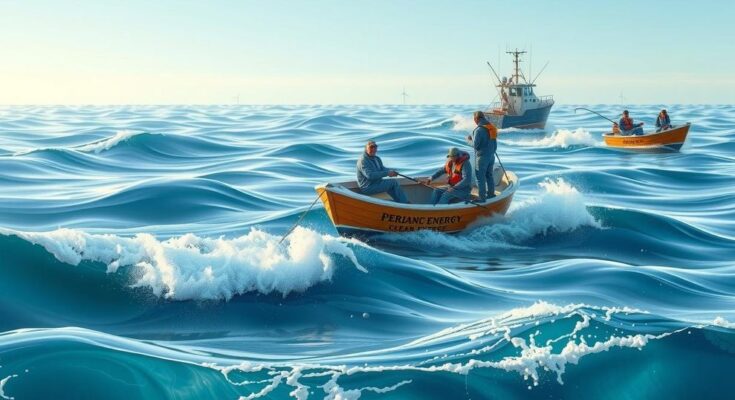Fishermen in Port Nolloth, led by Walter Steenkamp of Aukatowa Fisheries, are opposing offshore oil and gas projects they believe threaten the environment and their livelihoods. Their legal battles argue that the government’s environmental impact assessments are inadequate. As climate change impacts their fishing patterns, these communities advocate for sustainable practices to protect marine life and secure their future.
On 26 March 2024, Port Nolloth’s coastal environment was enveloped by a heavy fog while fishermen hoped for improved conditions to embark on their fishing endeavors. Walter Steenkamp, the chairperson of Aukatowa Fisheries, anxiously awaited calmer seas, as recent poor weather had hampered their earnings. Port Nolloth, a coastal village in South Africa’s Northern Cape, has a rich history in diamond mining and fishing, but both industries are facing severe challenges due to environmental and economic factors.
Steenkamp has long advocated for the rights of small fishers in South Africa, successfully obtaining recognition and fishing rights for his cooperative. Currently, he is campaigning against upcoming offshore oil and gas projects which threaten local marine life and his community’s livelihoods. The situation escalated in 2023 when TGS Geophysical Company planned a seismic survey near Port Nolloth, alongside Teepsa’s approval to drill exploratory wells in the area.
The South African government views these fossil fuel initiatives as crucial for energy security, especially after enduring persistent electricity shortages. However, groups such as Aukatowa Fisheries and environmental NGOs contest this perspective in court, arguing that the approvals for drilling and exploration lack comprehensive environmental impact assessments and fail to account for cumulative risks from multiple concurrent projects.
Concerns regarding the environmental ramifications of oil spills have been highlighted by attorneys such as Melissa Groenik, who noted the inadequate mitigation strategies presented in environmental impact reports. Expert testimonies have indicated that current assessments fail to accurately predict the consequences of potential spills on marine ecosystems.
Moreover, Groenik and other advocates express that the impacts of simultaneous fossil fuel operations on marine life are overlooked, intensifying risks to biodiversity. Carmen Mannarino from the Masifundise Development Trust emphasizes the need for a holistic evaluation of environmental impacts, arguing that independent judicial scrutiny could empower communities to demand responsible energy policies.
As climate change continues to affect the fishing industry, the local fishers witness fundamental shifts in marine patterns, further motivating their fight against fossil fuel exploitation. They are already experiencing adverse effects such as erratic fishing conditions and obstacles to sustainable livelihoods.
The basic premise is that the fight against fossil fuels is a battle for the survival of local communities, shielding their heritage from the adverse effects of climate change and industrial pollution. Fishermen like Steenkamp share a common goal: preserving the ocean not just for their own benefit, but for future generations.
Despite challenges, the legal struggles around offshore exploration in South Africa are yielding significant impacts by creating awareness and fostering public dialogue on energy use, conservation, and climate commitments. Steenkamp and other local fishers remain resolute in their commitment to protect local ecosystems from degradation and advocate for a sustainable future for their community.
In summary, the struggle of the fishermen of Port Nolloth illustrates a broader conflict regarding environmental conservation versus fossil fuel development. The community’s efforts to legally challenge oil and gas projects highlight the necessity for comprehensive environmental protections. Amidst changing marine conditions and climate impacts, the fight for sustainable practices remains critical for both the local economy and future generations. The experiences of the Aukatowa Fisheries cooperative serve as a poignant reminder of the reality faced by coastal communities globally.
Original Source: dialogue.earth




